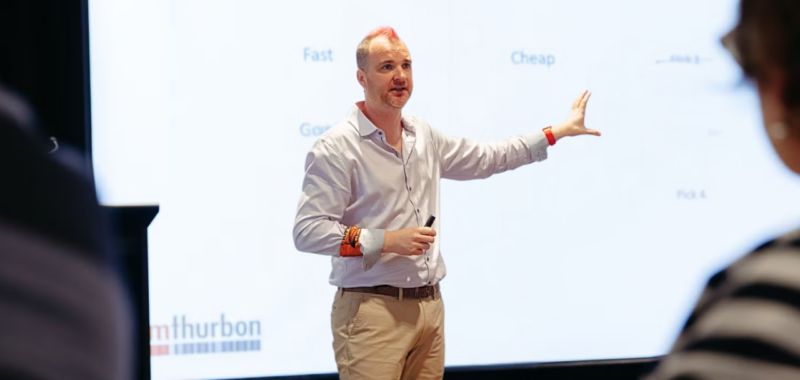In the ever-evolving real estate industry, thriving amid disruption means rethinking long-held assumptions about business models and operations.
Dominic Thurbon, an expert in organisational change, (and a world top 10 debater for anyone following that circuit!) conveyed this message at Elite Retreat, where he challenged real estate professionals to look beyond predictions and focus on reassessing their current assumptions.
“The real challenge,” he emphasised, “isn’t hearing new ideas. It’s applying them when you’re swamped by everyday demands.”
One of his key insights was that many businesses fail not because they can’t anticipate the future, but because they are stuck in their present assumptions.
“What assumptions are we living by that no longer serve us?” Dom asked, urging real estate leaders to open the door to innovative solutions.
To illustrate the pitfalls of rigid thinking, he recounted a historical anecdote from 1901, when London’s leaders convened to strategise for the city’s future.
Their biggest concern? Procuring enough horses to meet the transportation demands of 1925.
“The motor vehicle was already in existence, but their assumptions blinded them,” Dom explained.
The lesson for today’s real estate professionals is clear: relying too heavily on outdated models could leave businesses vulnerable to rapid change.
He also addressed how competitive advantage has shifted in intermediary-based industries like real estate.
“Fast, good, cheap—pick two,” used to be the rule for businesses, but Dom argued that in today’s market, companies must deliver all three to stay competitive.
He emphasised that simply excelling in these areas no longer provides an edge, saying, “You’re a commodity if you stop there.”
One standout example of differentiation, according to Dom, is Burberry’s use of technology to enhance the customer experience.
At its concept store in London, Burberry leverages facial recognition, RFID technology, and personalised marketing to create a hyper-tailored shopping experience.
“It’s the seamless blend of technology and the human touch that’s driving 150% sales increases at Burberry,” Dom explained.
While real estate might not have the resources of a luxury brand, the key is to find ways to create memorable experiences – whether through personalised property tours or using digital tools to engage clients.
Though, perhaps Dom’s most impactful message was the importance of embracing uncomfortable truths in business.
He recounted the story of Domino’s Pizza, where CEO Patrick Doyle publicly admitted in 2010 that their pizza “tasted like cardboard.”
This candid acknowledgment, followed by a commitment to improve, led to an 800% stock price increase over the next decade.
“Until we have honest conversations about our challenges, we can’t unlock meaningful change.”
For real estate professionals, this might mean confronting areas where marketing isn’t effective or where operational inefficiencies are holding the business back.
Dom’s message was clear: by challenging assumptions, embracing the truth, and focusing on the customer experience, real estate professionals can position themselves for long-term success.
“Now is the time to rethink your approach,” he urged, noting that while disruption presents challenges, it also creates opportunities for those willing to innovate.
Disruption isn’t just something to react to; it’s a catalyst for real change, and real estate professionals have the tools to navigate it successfully … if they dare to question the status quo.

